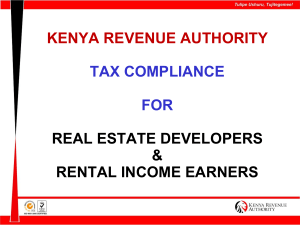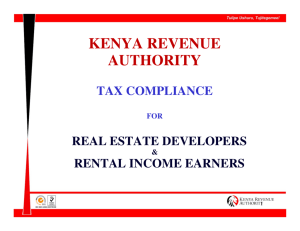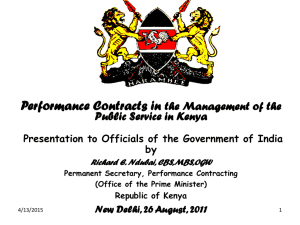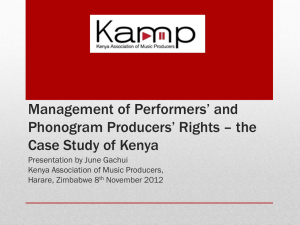How to determine Taxable Income…Cont.
advertisement
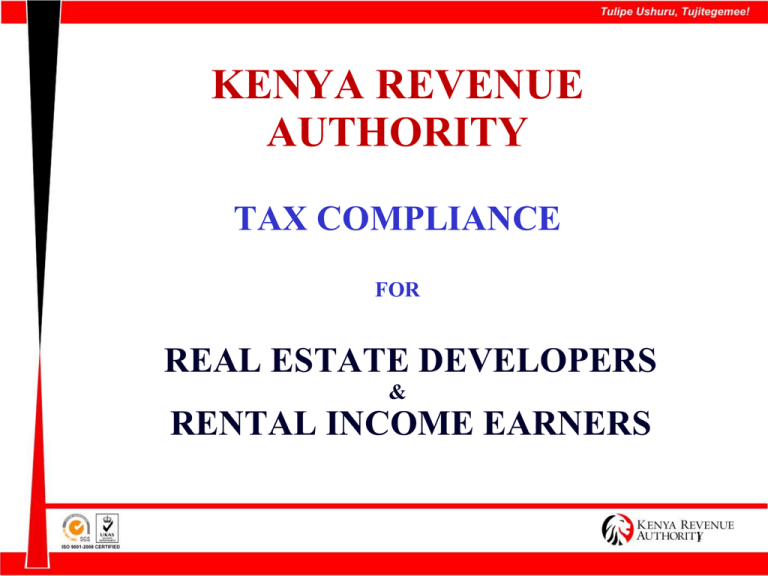
KENYA REVENUE AUTHORITY TAX COMPLIANCE FOR REAL ESTATE DEVELOPERS & RENTAL INCOME EARNERS 1 Scope of Presentation Introduction Types of Income Chargeable to Tax Return filing and Payment Tax Relief Tax Incentives KRA Expectations Conclusion 2 INTRODUCTION Taxation of income in Kenya is governed by the provisions of the Income Tax Act (Cap. 470), which became effective on 1st January 1974. Imposition of Income Tax Income Tax is a direct tax on income and is charged for each year of income upon all the income of a person, whether resident or non-resident, which accrued in or was derived from Kenya (Section 3(1)). 3 Types of Income Chargeable to Tax Business Income from any trade or profession. Income from employment or services rendered. Rent Income. Pensions Income. Investment Income - dividends and interest among others. (For Others please see Section 3 (2) of Income Tax Act, Cap 470). 4 Income from Business Real Estate Development This is a business of developing and selling of property. Tax is chargeable on the net profit after deducting allowable expenses under Section 15 of the Income Tax Act, Cap 470. 5 Income from Business…Cont. Examples of the allowable expenses include: • Professional fees paid to Quantity Surveyors, Architects, Civil engineers, Electrical engineers, e.t.c. • Material costs, • Labour, • Advertising/marketing and other administrative costs. Disallowable expenses are specified under section 16 of the Income Tax Act, Cap 470. 6 Income from Employment An amount paid to persons “Resident or Non Resident” in respect of any employment or services rendered by him in Kenya or outside Kenya; (Section 5 (1)(a) Income Tax Act, Cap 470), or An amount paid to a Non Resident person in respect of employment or services rendered to an employer who is resident in Kenya or the permanent establishment in Kenya of an employer who is not so resident, shall be deemed to have accrued in or derived from Kenya (Section 5(1)(b) Income Tax Act, Cap 470). 7 Rental Income Rental income is taxable under section 3(2) (a) (iii) of the Income Tax Act, Cap 470 Laws of Kenya. In addition, rent on non-residential buildings (Commercial) is taxable under section 5 & 6 of the VAT Act, Cap 476. What is Taxable? - All rent, premium or any other consideration for use or occupation of property. Who is taxable/assessable? - All persons in receipt of rental income unless exempted specifically under any laws. 8 Records and Information to be Maintained Proper records should be maintained for all rental property indicating the following: • • • • • • Land reference (L.R.) number Year of construction When first let and certificate of occupation Cost of construction Building plans Loan agreements 9 Records and Information to be Maintained…Cont. • Number of rentable units and rent per unit • Rent received and rent receipt books • Related expenses (invoices and receipts to support expenses) • Lease/tenancy agreements. • Bank and loan statements. • Rent schedules (income and expenditure account). • Any other relevant documents/records. 10 How to determine Taxable Income 1. Income Tax on Rental Income Prepare rent schedule for all let property showing; • Land reference number and location of the property • Gross rent received per property • Total gross rent received for all property • All expenses incurred per property 11 How to determine Taxable Income 1. Income Tax on Rental Income…Cont. Deduct only allowable expenses (incurred wholly andexclusively in the production of rental Income) to arrive at the chargeable rent (expenses to be supported with documentary evidence). Complete tax return and attach rent schedule in support thereof. Submit self-assessment return within six months after the end of the accounting period. 12 How to determine Taxable Income…Cont. 2. VAT on Commercial Rent Prepare VAT Account showing the VAT charged to tenants (output VAT) and allowable VAT on purchases (input VAT) incurred in the month. • The taxable value includes service charge and other incidental costs passed on to the tenants. 13 How to determine Taxable Income…Cont 2. VAT on Commercial Rent File VAT 3 return and make payment by 20th day of the following month to any of the appointed banks. Note:Receipts/invoices issued to tenants and receipts/invoices on purchases are supposed to show the VAT charged and shall be ETR generated. 14 How to determine Taxable Income…Cont. 3. VAT on Commercial Rent TAX POINT Means when tax is due and payable - though taxpayers can defer payment up to 20th of the month. Tax point is determined by the EARLIEST of the following:• Date supplies are made • Date of invoice • Date payment is made in full or part 15 How to determine Taxable Income…Cont. Examples of a Rent Schedule Example 1: Resident Individuals Mrs. Landlord has two property from which she earns rent as follows: Property A with 5 units, at Kshs.20,000 per month per unit and Property B with 10 units at Kshs.15,000 per month per unit. All the units were occupied by tenants throughout the accounting period of 2010. Her accounting period ends on 31st December, 2010. 16 How to determine Taxable Income…Cont. During the accounting period, she incurred the following expenses: • • • • • • • Land Rent/Rates Property insurance Agents fees Repairs School fees Loan interest Electricity – – – – – – – Kshs. 10,000 Kshs. 20,000 Kshs. 30,000 Kshs.160,000 Kshs.120,000* Kshs. 85,000 Kshs. 60,000 During the year, her principal loan repayment amounted to Kshs.250,000** 17 How to determine Taxable Income…Cont. Gross Rent income for the year: Property A - 5 units x Kshs.20,000 x 12 months Property B – 10 units x Kshs.15,000 x 12 months Total Rent income in Kshs. Less: Allowable expenses (Kshs.): Land Rent/Rates 10,000 Insurance 20,000 Agent’s fees 30,000 Repairs 160,000 Loan interest 85,000 Electricity 60,000 Net taxable rent income (Kshs.) Notes: 1,200,000 1,800,000 3,000,000 365,000 2,635,000 * School fees is a personal expenditure that is not allowable deduction. ** Principal Loan repayment is a capital item and not an allowable deduction. 18 Rates of Tax Different rates of tax are applicable to individuals and corporate entity depending on residence status. For resident individuals, the annual tax rates (on total annual income including net rent income) are as follows: On the first Kshs.121,968 .....................10% On the next Kshs.114,912 .....................15% On the next Kshs.114,912 .....................20% On the next Kshs.114,912 .....................25% On all income over Kshs. 466,704.........30% Note: The above scales are referred to as “graduated” 19 Rates of Tax…Cont. Resident companies are taxable at a rate of 30% Non-residents (for tax purpose) - withholding tax @ 30% on gross rent as a final tax. Estate of deceased landlords - chargeable at resident corporate tax rate of 30%. VAT on non-residential Rental Income (Commercial rent) - charged at 16% . 20 Tax Computation Taxable annual net rent income for the year – Kshs.2,635,000 The first Kshs.121,968 @ 10% 12,197 The next Kshs.114,912 @ 15% 17,237 The next Kshs.114,912 @ 20% 22,982 The next Kshs.114,912 @ 25% 28,728 The balance of Kshs.2,168,296@30% 650,488 Total tax Payable 731,632 Less: Personal relief 13,944 Net tax payable 717,688 21 Withholding Tax- Section 35 (1) & 35 (3) This is a method whereby the payer of certain incomes is responsible for deducting tax at source from payments due to certain payees and remitting the tax so deducted to the Commissioner, on or before the 20th day of the following month. The End of Year Withholding Tax Return (W10F) is due on or before the last day of February of the following year. Rates vary on each of the types of income depending on whether the recipient of the income is a Resident or Non Resident. Withholding TaxSection 35 (1) & 35 (3)…Cont. Management or Professional or Training fees: - @ 10% for Residents – w.e.f. 9th June, 2011. - @ 20% for Non-Residents. Contractual fee in respect of building, civil or engineering works: - @ 3% for Residents. - @ 20% for Non – Residents. Rents received by Non-Residents - @ 30% Payment Mode If Mrs. Landlord had paid 4 equal instalments of Kshs.150,000 each for the year, totalling Kshs.600,000 then she would have a balance of Kshs.117,688 to pay by 30th April 2011. However, if she had not paid any instalments in advance, then the entire amount of the Kshs.717,688 would be payable by 30th April plus penalties and interest for failure to pay instalments when they were due as per the law. 24 Payment of Instalment Tax The installment payments are spread evenly @ 25% of the tax due and payable on or before the 20th day of the 4th, 6th, 9th and 12th month of the accounting period for all taxpayers. Instalment tax is paid by persons (individual and corporate) whose tax liability for the accounting period exceeds Kshs.40,000. 25 Payment of Instalment Tax…Cont. However if tax liability does not exceed Kshs. 40,000 the tax is payable by 30th of the fourth month after the accounting period. The balance of tax is payable on or before the last working day of the fourth month following the end of the year of income or accounting period. Filing of Returns and Payment of Taxes Filing of tax returns is done using the prescribed forms, however, taxpayers are encouraged to file on line. To file online, you must register with KRA online services. Online filers are required to generate an e-slip for payment and present it to any branch of the National Bank of Kenya or Co-operative Bank of Kenya with the applicable tax due. For details on how to file your returns online, please visit the KRA online services at www.kra.go.ke/portal. 27 Tax Reliefs Personal relief for Resident Individuals :– Kshs.13,944 per annum. Relief on premiums paid for Life, Education and Health policy for Resident Individuals:- 15% of premiums paid subject to a maximum of Kshs.60,000 per annum (w.e.f. 1st January, 2007). Note: - Life or education policies – whose term commences on or after 1st January, 2003. - Health policy whose term commences on or after 1st January, 2007. 28 Tax Incentives Deduction of interest paid on Mortgage for owneroccupied property, subject to a maximum of Kshs.150,000 per year. Deduction of funds deposited under a Registered Home Ownership Savings Plan, subject to a maximum of Kshs.48,000 per year. 29 Tax Incentives…Cont. Industrial Building Allowance on the cost of construction as per paragraph 1(1) of the Second Schedule of the Income Tax Act. The applicable rates depend on; the nature, use and area the building is constructed. • Rental residential buildings done in planned residential areas approved by the Minister for Housing; the rate of allowance is 5%; (w.e.f 1st January 2008) . However, if the developer put up roads, power, water, sewers and other social infrastructure then the rate is 25% (w.e.f 1st January 2010). 30 Tax Incentives…Cont. Wear and Tear allowance on machinery and equipment as per the Second Schedule of the Income Tax Act, Cap 470. Incentives to Real Estate Developers Section 20C of the Income Tax Act exempts income of Real Estate Investment Trusts (REITs) from taxation. (This incentive is available effective 1st January, 2012). Under the VAT Act, investors in low income housing projects qualify to apply for VAT remission (Effective from 15th June 2007). Relevant regulations are contained in Legal Notice No. 115 of 2nd September, 2008. 31 Facilitation Measures To facilitate and encourage taxpayers to voluntarily comply the following measures have been put in place: • Help desks set up at Times Tower and in all Domestic Taxes Department stations country wide including satellite stations. • To provide taxpayers with relevant information on Real Estate and Rental Income a webpage has been created at the KRA website. Facilitation Measures…Cont • Information pack containing information on what taxpayers need to know and answers to Frequently Asked Questions (FAQs) are available at the web page. • The following email address created to enhance communication between KRA and taxpayers on areas of concern; rentalincome@kra.go.ke • Planned Countrywide taxpayers’ sensitization seminars. KRA Expectations Voluntary disclosure of income earned by real estate developers and rental income earners. Timely filing and payment of the self assessed taxes by real estate developers and rental income earners. Keeping of proper records and any relevant information for tax purposes. 34 CONCLUSION Taxpayers are encouraged to comply with provisions of the relevant laws to avoid penalties and interest that may accrue due to non compliance. Taxpayers are encouraged to get relevant assistance from KRA. For professional advice Taxpayers are encouraged to contact ICPAK (www.icpak.com). KRA upholds partnership with key stakeholders and will ensure accurate Tax information is provided in order to enhance Voluntary Tax Compliance. Tulipe Ushuru, Tujitegemee! 36 Note: The Income Tax Act Cap 470 and VAT Act Cap 476 of the laws of Kenya are available and can be downloaded at the KRA website; www. kra.go.ke Disclaimer: Taxpayers are notified that if there is any inconsistency between the provision of the Revenue Laws and the information contained herein, then the Revenue Laws shall prevail. For further clarification, please contact Mr. David Gichohi on Tel. 020- 2816095. You may also visit the Real Estate and Rental Income Help Desk at Times Tower Building, Ground Floor or your nearest KRA Station for assistance. You can also communicate with us via email; rentalincome@kra.go.ke END THANK YOU Tulipe Ushuru, Tujitegemee! 38
